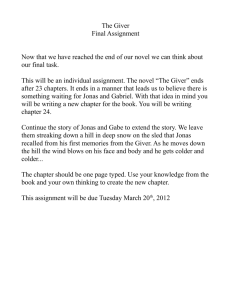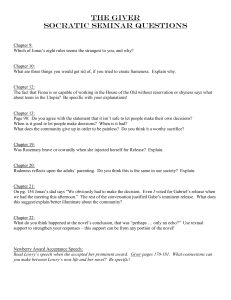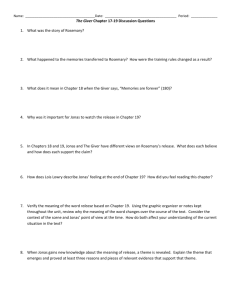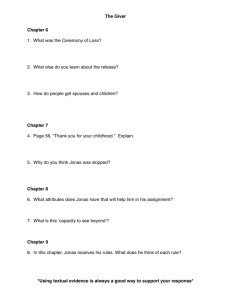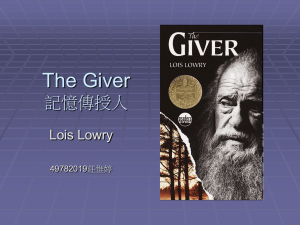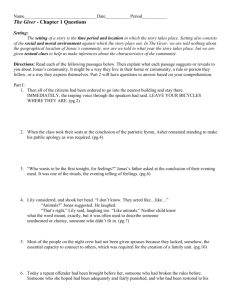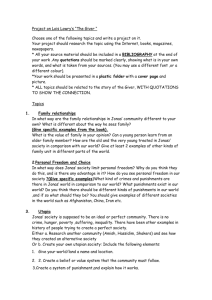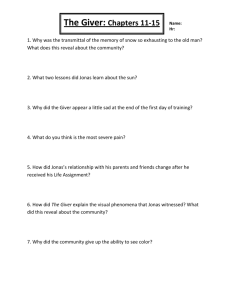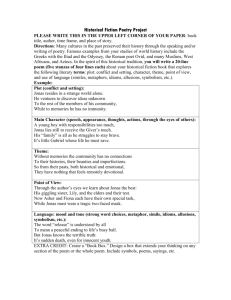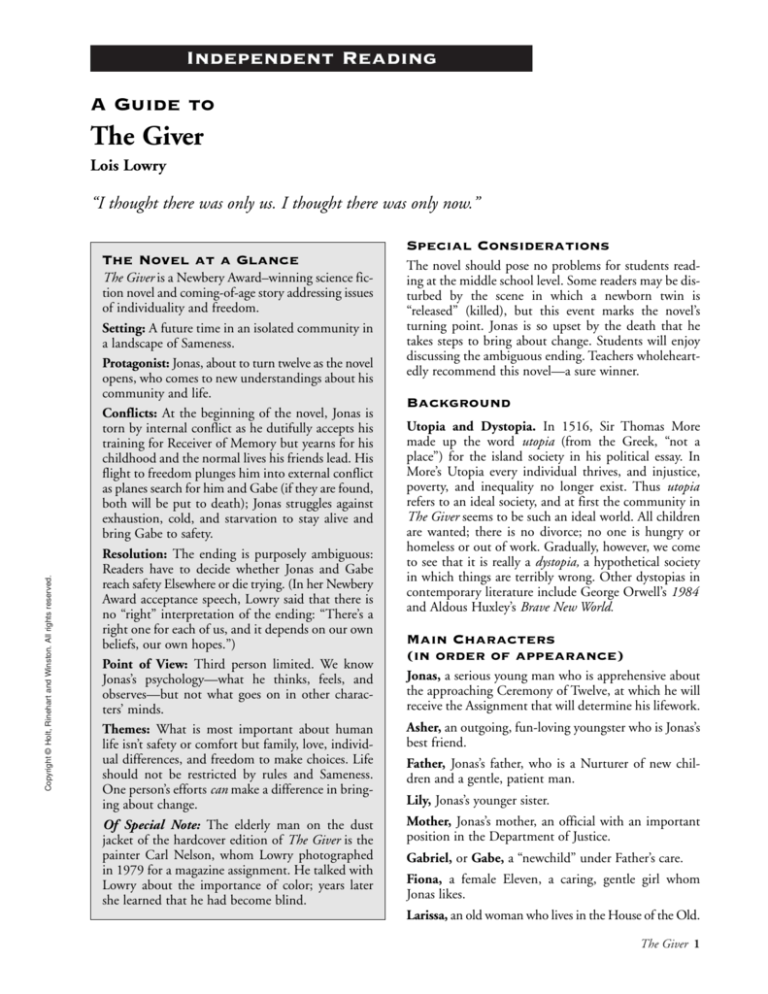
Independent Reading
A Guide to
The Giver
Lois Lowry
“I thought there was only us. I thought there was only now.”
Special Considerations
Copyright © Holt, Rinehart and Winston. All rights reserved.
The Novel at a Glance
The Giver is a Newbery Award–winning science fiction novel and coming-of-age story addressing issues
of individuality and freedom.
Setting: A future time in an isolated community in
a landscape of Sameness.
Protagonist: Jonas, about to turn twelve as the novel
opens, who comes to new understandings about his
community and life.
Conflicts: At the beginning of the novel, Jonas is
torn by internal conflict as he dutifully accepts his
training for Receiver of Memory but yearns for his
childhood and the normal lives his friends lead. His
flight to freedom plunges him into external conflict
as planes search for him and Gabe (if they are found,
both will be put to death); Jonas struggles against
exhaustion, cold, and starvation to stay alive and
bring Gabe to safety.
Resolution: The ending is purposely ambiguous:
Readers have to decide whether Jonas and Gabe
reach safety Elsewhere or die trying. (In her Newbery
Award acceptance speech, Lowry said that there is
no “right” interpretation of the ending: “There’s a
right one for each of us, and it depends on our own
beliefs, our own hopes.”)
Point of View: Third person limited. We know
Jonas’s psychology—what he thinks, feels, and
observes—but not what goes on in other characters’ minds.
Themes: What is most important about human
life isn’t safety or comfort but family, love, individual differences, and freedom to make choices. Life
should not be restricted by rules and Sameness.
One person’s efforts can make a difference in bringing about change.
Of Special Note: The elderly man on the dust
jacket of the hardcover edition of The Giver is the
painter Carl Nelson, whom Lowry photographed
in 1979 for a magazine assignment. He talked with
Lowry about the importance of color; years later
she learned that he had become blind.
The novel should pose no problems for students reading at the middle school level. Some readers may be disturbed by the scene in which a newborn twin is
“released” (killed), but this event marks the novel’s
turning point. Jonas is so upset by the death that he
takes steps to bring about change. Students will enjoy
discussing the ambiguous ending. Teachers wholeheartedly recommend this novel—a sure winner.
Background
Utopia and Dystopia. In 1516, Sir Thomas More
made up the word utopia (from the Greek, “not a
place”) for the island society in his political essay. In
More’s Utopia every individual thrives, and injustice,
poverty, and inequality no longer exist. Thus utopia
refers to an ideal society, and at first the community in
The Giver seems to be such an ideal world. All children
are wanted; there is no divorce; no one is hungry or
homeless or out of work. Gradually, however, we come
to see that it is really a dystopia, a hypothetical society
in which things are terribly wrong. Other dystopias in
contemporary literature include George Orwell’s 1984
and Aldous Huxley’s Brave New World.
Main Characters
(in order of appearance)
Jonas, a serious young man who is apprehensive about
the approaching Ceremony of Twelve, at which he will
receive the Assignment that will determine his lifework.
Asher, an outgoing, fun-loving youngster who is Jonas’s
best friend.
Father, Jonas’s father, who is a Nurturer of new children and a gentle, patient man.
Lily, Jonas’s younger sister.
Mother, Jonas’s mother, an official with an important
position in the Department of Justice.
Gabriel, or Gabe, a “newchild” under Father’s care.
Fiona, a female Eleven, a caring, gentle girl whom
Jonas likes.
Larissa, an old woman who lives in the House of the Old.
The Giver 1
The Giver (the name this character tells Jonas to call
him by), one of the Elders, the current Receiver of
Memory. He is an elderly man and has been Receiver
for a very long time.
Plot
Chapter 1. We meet Jonas, the main character, and
gradually learn details of the setting: A Speaker broadcasts orders to the whole community; apologies are a ritual. Everyone in a family discusses his or her feelings at
the end of the day. Something called release is a punishment for any third transgression; it is not a punishment
for the elderly or for a newchild who is not thriving.
Jonas says he feels apprehensive about the approaching
Ceremony of Twelve.
Chapter 2. Jonas’s parents talk to him about the
Ceremonies that take place each December. One-yearolds are named and given to families whose applications
have been approved. Father tells of a newchild scheduled to be named Gabriel who is not thriving.
Chapter 3. Father brings Gabe home for extra nurturing. Like Jonas, Gabe has light eyes. Lily remarks that
perhaps they have the same Birthmother and wishes to
be a Birthmother some day. Mother describes a
Birthmother’s life as being pampered for three years, giving birth three times, and then working as a laborer for
the rest of her life. Jonas recalls the Speaker’s reprimand
the previous month—directed at him, as everyone
knew—for taking an apple home from the recreation
area. He and Asher had been playing catch when Jonas
thought he saw the apple change for an instant in midair
(an incident that foreshadows Jonas’s unique abilities).
Jonas has seen such changes on four occasions, but
Asher has seen nothing extraordinary.
Chapter 4. Jonas bikes to the House of the Old, where
he does volunteer work. Asher and Fiona are already in
the bathing room, each gently washing an elderly resident. Jonas bathes Larissa, who describes the release ritual
of an elderly resident named Roberto, which was performed that morning. All of the Old assembled to hear
the telling of Roberto’s life, and Roberto left The House
of the Old with a look of “pure happiness.” When Jonas
asks where Roberto went after the ritual, Larissa cannot
tell him because she doesn’t know.
Chapter 5. At home the next morning during the daily
dream-telling ritual, Jonas recounts a vivid dream. He is
in the bathing room of the House of the Old, bare
chested and urging Fiona to get into the tub so that he
can bathe her. She laughingly refuses. Jonas’s parents say
he has felt his first Stirrings and is therefore ready to
begin taking daily medication to stop them.
Chapter 6. As Mother braids Lily’s hair on the first
morning of the two-day December Ceremonies, we
2 The Giver
learn more details of the community’s rules regarding
children: Girls’ hair is worn braided; back-buttoned
coats are worn until Seven to encourage interdependence;
at Seven front-buttoned coats are worn so that children
will develop independence; bicycles are distributed at
Nine. In the first ceremony of the day, newchildren are
named and given to their assigned families. Father
reports that Gabe, who is still not sleeping soundly, has
been granted an extra year of nurturing and will spend
nights with Jonas’s family.
Chapter 7. Twelves are called to the stage in their birth
order, and Jonas waits impatiently for his number—
Nineteen. The Committee of Elders carefully matches
each individual’s talents and interests with a job necessary to the community. The Chief Elder gives a long
speech for each young person. Jonas is horrified and
humiliated when the Chief Elder skips his number.
Chapter 8. When all the Assignments have been made,
the Chief Elder apologizes for causing the community
and Jonas anxiety. She says that Jonas has been selected,
not assigned, to be the next Receiver of Memory, the
most honored job in the community. The current
Receiver was to have been replaced ten years ago, but
the selection failed. Jonas has all the necessary qualities:
intelligence, integrity, courage, wisdom, and the
Capacity to See Beyond. Jonas wants to say that he can’t
accept his selection, but when he looks out over the
audience, it changes for an instant, the way the apple
did. Suspense builds as Jonas fears his future.
Chapter 9. In his training folder, Jonas finds only a single page on which are written eight rules. The first two
rules tell him to go to the Annex behind the House of the
Old for training and to go home immediately afterward.
The third rule, which startles Jonas, says he is to be
exempt from all rules about rudeness and may ask any
question of any citizen. The fourth rule warns him not to
discuss his training with anyone. The fifth prohibits him
from dream-telling, and the sixth forbids him to take any
medication except for illness or injury unrelated to his
training. Rule seven prohibits him from applying for
release. Rule eight says that he may lie. This stuns him, for
it is contrary to his training since earliest childhood: As a
child, even saying he was starving (a bit of foreshadowing here) was considered lying. Jonas thinks that if others
have been told they can lie, he cannot believe anyone.
Chapter 10. In a locked room lined with books, The
Receiver welcomes Jonas and explains that he will transmit to him all the memories of the past of the whole
world. Jonas doesn’t understand what he means by “the
whole world” or “generations before him.” He thought
there was only their community and now. The Receiver
feels weighted with memories of all Elsewhere and of
the past—as if he were trying to go downhill on a sled
in deep snow. Jonas doesn’t understand, so the Receiver
says he will begin by giving Jonas the memory of snow.
He switches the Speaker off and tells Jonas to remove
his tunic and lie face down on a bed.
Copyright © Holt, Rinehart and Winston. All rights reserved.
Chief Elder, the female Elder who gives a personalized
speech announcing each individual’s Assignment at the
Ceremony of Twelve.
Chapter 11. With no words, just by touching Jonas’s
back lightly, the old man transmits the memory. Jonas
actually feels the cold; then he can see snow, a sled, a
hill and feel himself sledding downhill (foreshadowing
here—remember that sled). When Jonas opens his eyes,
the Receiver explains that the memory he has just given
Jonas is a very distant memory, from before Climate
Control, before the community went to Sameness. The
Receiver then transmits memories of sunshine and sunburn. Before Jonas leaves, the old man, who seems terribly weary and sad, tells Jonas to call him The Giver.
Chapter 12. As Jonas and Fiona bicycle to their training sessions the next day, Fiona’s hair changes the same
way the apple did. When Jonas asks about these
changes, The Giver tells Jonas to recall the sled memory
and to look down at the sled; it has the same quality as
the apple and Fiona’s hair. Jonas is seeing the color red,
The Giver explains. The sled’s color doesn’t go away
because it is a memory from a time when there were
colors (now there aren’t). Before there was Sameness,
even people’s skins were of different colors.
Copyright © Holt, Rinehart and Winston. All rights reserved.
Chapter 13. Weeks pass, and Jonas tells The Giver that
the lack of color is unfair, that he wants to make
choices. Jonas tries and fails to transmit memories to
Asher (the color red) and to Lily and his father (the
shooting of an elephant). We learn that The Giver
advises the Committee of Elders when it faces something its members have never experienced before. Some
days The Giver dismisses Jonas without training. Jonas
asks what causes his pain, and The Giver says the time
has come for Jonas to feel pain.
Chapter 14. This time Jonas is thrown from the sled,
breaks his leg, and feels searing pain. The Giver explains
that it is pain that leads to wisdom. For example, when
the Committee considered increasing the number of
children in a family to three, The Giver advised them
not to, remembering the pain of hunger. Overpopulation
led to worldwide hunger, he tells Jonas, which led to
warfare. Jonas says everyone should share the pain, and
The Giver replies that he’s never been able to think of a
way to change things.
Gabe is growing on schedule, thriving during the
day but still fretful at night. Jonas offers to have Gabe
sleep in his room that night. When Gabe is restless during the night, Jonas pats his back while thinking about
a new memory: sailing on a lake. Jonas discovers he has
inadvertently transmitted the sailing memory to Gabe
and decides not to tell The Giver what has happened.
Chapter 15. Jonas finds The Giver in great pain and
asks what he can do to help, so The Giver gives Jonas
the memory of war: Horses and men lie dying and dead
on a foul-smelling field; a boy in gray uniform begs for
water. Jonas, in great pain from an arm wound that has
shattered his bone, gives the boy a drink, and the boy
dies. When Jonas can no longer stand the pain, he
opens his eyes. The Giver asks Jonas to forgive him.
Chapter 16. The Giver transmits his favorite memory:
a family Christmas celebration, complete with grandparents and beautiful imagery. He identifies the feeling
that is so strong in the memory: love. That night, Jonas
asks his parents if they love him. His mother replies that
the word is generalized and meaningless. Jonas whispers
to the sleeping Gabe that things could change.
Everyone could have memories; there could be colors,
grandparents, and love. We see a change in Jonas and
new character traits. The next morning when he throws
away his anti-Stirrings pill, Jonas shows independence.
Chapter 17. Four weeks have passed. On an unscheduled holiday, Jonas finds Asher, Fiona, and other children playing a war game. He tells Asher not to play it
any more but cannot explain why. That night Father
talks about the soon-to-be-born identical twins, who
will be weighed and the smaller one released. Jonas asks
if someone from Elsewhere comes to get the released
twin, and Father says yes.
Chapter 18. Jonas asks The Giver about the failed
Receiver of ten years before. The Giver says Rosemary
trained for five weeks before requesting release. The
Giver didn’t give her physical pain but transmitted
memories of loneliness, loss, poverty, hunger, and terror.
After her release, the memories she’d received overwhelmed the people. Jonas asks what would happen if he
drowned after having received a year’s worth of memories. The Giver tells him to stay away from the river.
Chapter 19. When Jonas wishes he could watch the
identical twin’s release, The Giver obtains a tape recording of that morning’s release, and they watch it together
(the novel’s turning point). Jonas’s father and his assistant carry two newborns into a room. Father weighs the
two, gives the heavier one to his assistant, and injects a
clear liquid into the smaller infant’s forehead. The baby
cries and goes limp. Stunned, Jonas realizes his father
has killed the baby—that is what release means and how
it is accomplished. Father puts the baby’s body into a
carton and throws it into a waste chute. The Giver tells
Jonas that he watched the tape of Rosemary’s release.
She asked to inject herself and did. Jonas feels “a ripping sensation inside,” a terrible pain.
Chapter 20. In a key scene, Jonas, shouting and crying, refuses to go home. The Giver says he may stay that
night and assures Jonas that people obey their orders to
release others because they know nothing and have no
real feelings. He tells Jonas of a plan: In two weeks at
midnight before the December Ceremonies begin,
Jonas will leave his home. The Giver will drive Jonas
across the river, part of the way on his journey to
Elsewhere. The Giver will return and tell everyone that
Jonas has drowned in the river. The Giver reveals that
Rosemary was his daughter.
Chapter 21. That night Jonas is forced to leave immediately. In a flashback we find out that at dinner,
Father has revealed that Gabe is to be released the next
The Giver 3
Chapter 22. One night, Jonas falls, twisting his ankle
and scraping his knee, but Gabe is unhurt. Now Jonas
rides during the day through the beauties of nature
without Sameness. Jonas is afraid they will starve and
wonders if he has made a wrong choice. But he had no
choice, for Gabe would have been killed. The terrain
changes; now there are hills and rain. Gabe cries from
hunger and cold. Jonas cries too, afraid he can’t save Gabe.
Chapter 23. Jonas feels Elsewhere close by but has little hope that they will reach it. It is cold and snowy.
Jonas ties Gabe to his chest to warm him and gives him
memories of sunshine, but they fade quickly. The bike
cannot move in the snow, so Jonas struggles on foot up
a steep hill. Suddenly he is flooded with joy. He tells
Gabe that they’re “almost there” and finds the sled that
he knew would be waiting for them at the top of the
hill. (This is the story’s climax.) Jonas sits on the sled,
clutching Gabe, and they sled toward Elsewhere. He
sees lights and Christmas trees and families. As the two
speed downward, Jonas is sure the families are waiting
to welcome him and Gabe. He thinks he hears music
for the first time.
Approaches for
Post-Reading Activities
The most important element of the novel is setting,
and the conflicts in the story are directly connected
with the setting. The writer has created a community so
different from any community students know that they
will enjoy discussing its structure and its implications
for our time. Discussion groups or students working
individually on research projects might focus on the
following activity.
Analyzing Society
One of the first things students will want to do is discuss the community depicted in the novel.
• What is wrong with Jonas’s community? Is there
anything about it that is right?
Copyright © by Holt, Rinehart and Winston, Inc.
All rights reserved. No part of this publication may be reproduced
or transmitted in any form or by any means, electronic
or mechanical, including photocopy, recording, or any information
storage and retrieval system.
Printed in the United States of America
4 The Giver
• What problems in our society no longer exist in
Jonas’s community?
• Are the people in Jonas’s community happy? How
do you think you would feel if you were living
there? What would you miss most?
• Do communities exist today that are very much
apart from “mainstream” twentieth-century life?
What are they like? What is their purpose?
• Ask students what they think their own community might be like at a far-distant date—the year
3000 perhaps.
Meet the Writer
Lois Lowry (1937– ) says that when she writes, she
knows how a novel will begin and end but makes up the
rest as she goes along. In her fiction she tries to “help
adolescents answer their own questions about life, identity, and human relationships.” In her Newbery Award
acceptance speech, she said, “The man that I named
The Giver passed along to the boy knowledge, history,
memories, color, pain, laughter, love, and truth. Every
time you place a book in the hands of a child, you do
the same thing.”
Read On
Lois Lowry, Number the Stars. Ten-year-old Annemarie
Johansen and her family join the Danish resistance
efforts to smuggle Jews to neutral Sweden from Nazioccupied Denmark. (1990 Newbery Medal)
Isaac Asimov, “The Fun They Had.” An ironic short
story about a school of the future, set in 2155.
Ray Bradbury, “The Naming of Names.” A short
story about a man and his family who think they are
colonizing Mars but find that the Martian setting is
transforming their attitudes and their very identities.
Virginia Driving Hawk Sneve, “The Medicine Bag.”
In this short story about the Sioux coming-of-age
tradition, a great-grandfather passes on the most important values of his culture to his great-grandson.
Ray Bradbury, “There Will Come Soft Rains.” In a
future society where technology does almost everything, something goes very wrong.
Copyright © Holt, Rinehart and Winston. All rights reserved.
morning because he cried all night at the Nurturing
Center. Jonas steals his father’s bike and a little food
and, with the sleeping Gabe in the child’s seat, crosses
the river on his way to Elsewhere. Days pass, and
planes search for them; they sleep by day, and Jonas
pedals all night. When he hears search planes, Jonas
transmits memories of snow to Gabe so that they can
evade the planes’ heat-seeking devices.

